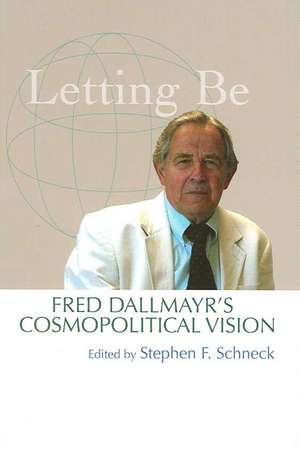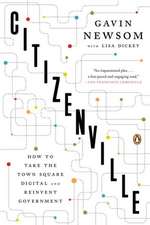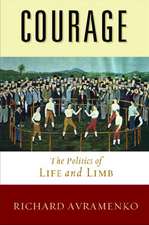Letting Be – Fred Dallmayr`s Cosmopolitical Vision
Autor Stephen Schnecken Limba Engleză Paperback – 14 sep 2006
Preț: 174.52 lei
Nou
Puncte Express: 262
Preț estimativ în valută:
33.40€ • 34.74$ • 27.57£
33.40€ • 34.74$ • 27.57£
Carte tipărită la comandă
Livrare economică 14-28 aprilie
Preluare comenzi: 021 569.72.76
Specificații
ISBN-13: 9780268041243
ISBN-10: 0268041245
Pagini: 406
Dimensiuni: 152 x 229 x 21 mm
Greutate: 0.64 kg
Ediția:1st Edition
Editura: MR – University of Notre Dame Press
ISBN-10: 0268041245
Pagini: 406
Dimensiuni: 152 x 229 x 21 mm
Greutate: 0.64 kg
Ediția:1st Edition
Editura: MR – University of Notre Dame Press
Recenzii
“This work is a festschrift for political theorist Fred Dallmayr that aims to attend to the full range of issues and concerns animating Dallmayr's work over the course of his career, including efforts to construct a critical phenomenology of politics, apply the thinking of Martin Heidegger to a practical ontology of politics, and define a form of 'cosmopolitics' that incorporates the Ghandian principle of 'swaraj' or self-rule.” —Reference and Research Book News, May 1, 2007
Notă biografică
Stephen F. Schneck is associate professor of politics at the Catholic University of America.
Contributors include: Michaelle Browers, John Francis Burke, Neve Gordon, David Ingram, Hwa Yol Jung, Thomas McCarthy, Chantal Mouffe, Morton Schoolman, Calvin O. Schrag, Tracy B. Strong, Ronald J. Terchek, Franke Wilmer, and Krzysztof Ziarek.
Descriere
This volume gathers essays by fourteen scholars, written to honor Fred Dallmayr and the contributions of his political theory. Stephen F. Schneck's introduction to Dallmayr's thinking provides a survey of the development of his work. Dallmayr's “letting be,” claims Schneck, is much akin to his reading of Martin Heidegger's “letting Being be,” and should be construed neither as a conservative acceptance of self-identity nor as a nonengaged indifference to difference. Instead, he explains, endeavoring to privilege neither identity nor difference, the hermeneutic circle for Dallmayr must also be one of thoroughgoing critique and praxis. And, indeed, what joins together Dallmayr's many essays and explorations, what inheres within his “cosmopolitan” understanding of the contemporary world, and what lends his analyses their imperative, is this same “letting be.”
"How many of us, over the last forty years, have opened up this or that book by Fred Dallmayr to acquaint ourselves with a new thinker or intellectual movement? It has happened to me several times. Each time, something else happens too. I become alert again to the distinctive and noble temper expressed in Dallmayr's work. Letting Be consists of a series of essays by leading scholars who articulate and appreciate this temper, particularly as it has found expression in his thought about global politics work over the last two decades. This is a fine study, devoted to a thinker whose temper of critical responsiveness deserves wide emulation." —William E. Connolly, Krieger-Eisenhower Professor, Johns Hopkins University
"These essays constitute a marvelous, extended conversation on how political theory should delineate its future tasks. The reader is treated to a lively debate about a crucial set of questions: what strands of traditional Western political thought offer the best resources today; how do we think more comparatively about the foundations of political life; how do we engage more fruitfully Islamic, Indian, and mestizo contributions; and how do we best envision cross-cultural dialogue and imagine the shape of a "cosmopolis" in ways that will do greater justice to human dignity and diversity? All in all a rich feast honoring a remarkable man and scholar, Fred Dallmayr." —Stephen K. White, James Hart Professor, University of Virginia
“This is not the first Festschrift for Dallmayr, and it may not be the last, but it is the first that begins to be in a position to assess his long career with all its twists and turns. I have never fully understood Dallmayr as a creative thinker in his own right until now, and even when I sensed he was, I couldn't precisely say how. Now I can.” —C. Fred Alford, University of Maryland














